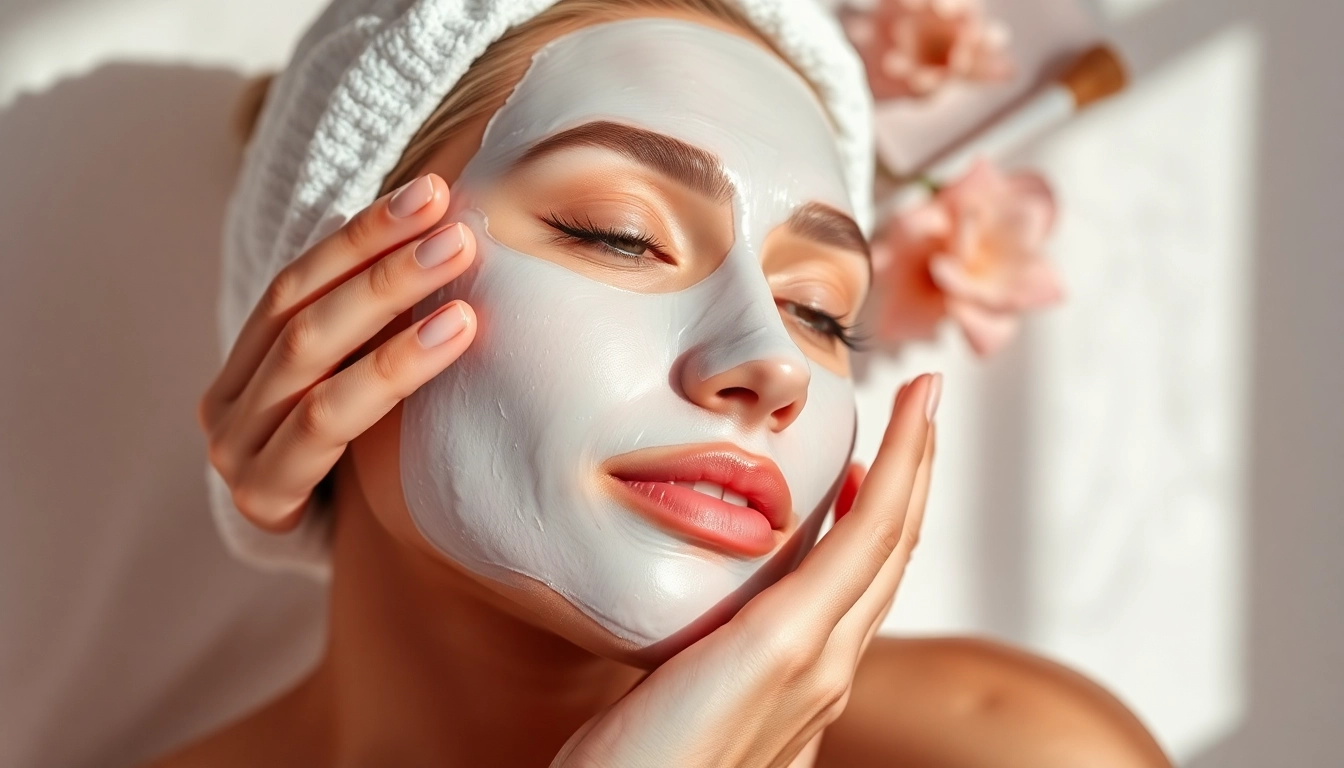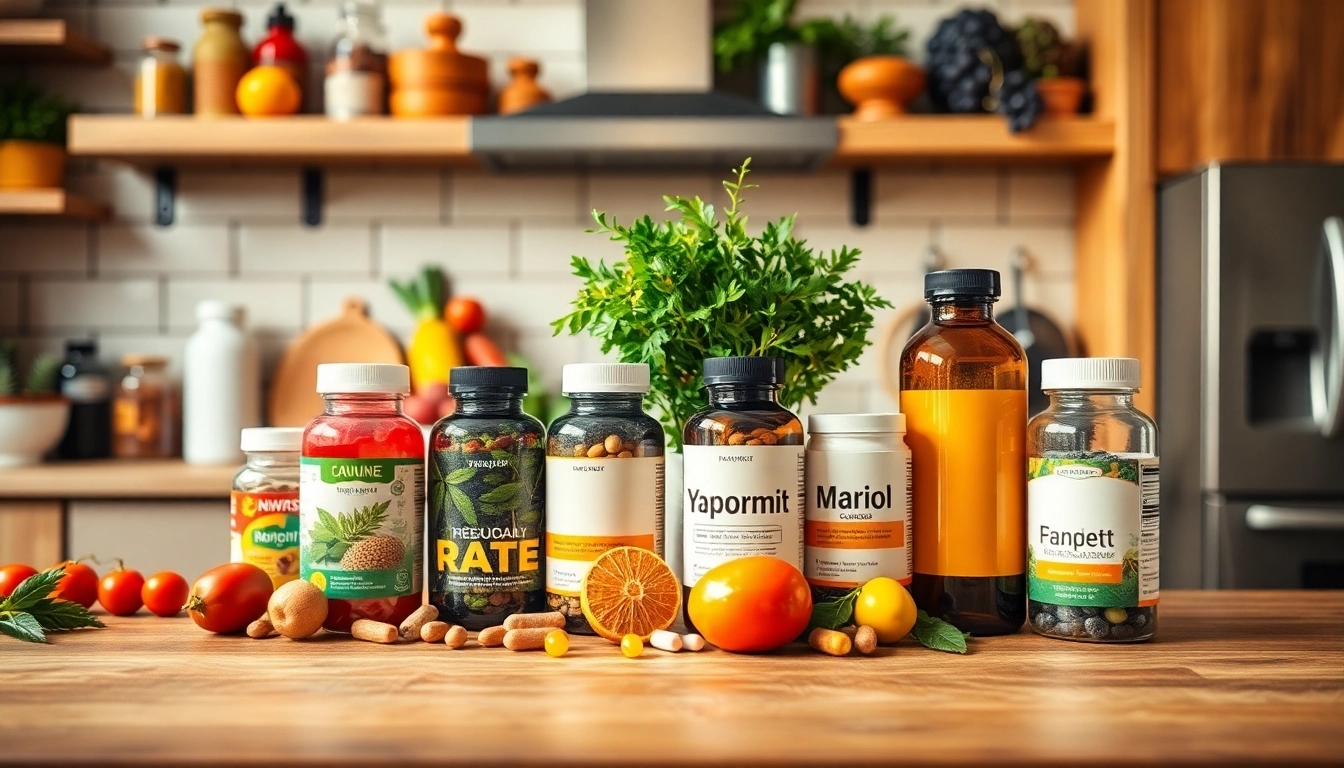What is a Facial Mask?
A facial mask is a skincare product designed to deliver intensive treatment to the face, often featuring a rich blend of vitamins, minerals, and hydrating agents. Typically applied in a thick layer and allowed to sit for a specified period, facial masks serve various purposes including hydration, exfoliation, and firming. These products are available in numerous formulations, catering to different skin types and concerns, making them a versatile addition to any skincare routine. Using a facial mask not only enhances your skin’s appearance but also provides a moment of self-care and relaxation.
Diverse Types of Facial Masks
Facial masks come in various types, each engineered to address specific skin needs. Here are some common categories:
- Cream Masks: Thick and hydrating, these are ideal for dry or mature skin types, providing deep nourishment.
- Clay Masks: Often utilized for oily and acne-prone skin, clay masks absorb excess oil and impurities, promoting clearer skin.
- Sheet Masks: Infused with serums, these pre-cut fabric masks provide concentrated benefits and are easy to use, making them popular for quick hydration.
- Peel-Off Masks: Designed to create a film that tightens on the skin, peel-off masks help remove dead skin cells and improve texture.
- Gel Masks: Lightweight and soothing, these are typically suitable for sensitive skin, providing cooling effects.
Benefits of Using Facial Masks
The advantages of incorporating facial masks into your beauty routine are extensive and can lead to noticeable improvements in skin health. Here are some key benefits:
- Deep Cleansing: Many masks draw out impurities from the pores, contributing to a clearer complexion.
- Hydration: Masks rich in hydrating ingredients can help restore moisture levels, resulting in plump, healthy skin.
- Targeted Treatment: Masks can be formulated to target specific issues like acne, sun damage, or wrinkles.
- Relaxation: The act of applying a mask promotes a moment of self-care, reducing stress and enhancing overall well-being.
- Boosts Efficacy of Other Skincare Products: Using a mask can prepare your skin for better absorption of serums and moisturizers applied afterward.
How to Choose the Right Facial Mask for Your Skin Type
Selecting the appropriate facial mask is crucial for achieving your desired results. Here’s a simple guide based on skin types:
- Dry Skin: Look for masks that contain hydrating ingredients like hyaluronic acid, glycerin, or natural oils.
- Oily Skin: Clay or charcoal masks are ideal to absorb excess oil and prevent breakouts.
- Combination Skin: Use multi-masking techniques, applying different masks to specific areas of the face as needed.
- Sensitive Skin: Opt for calming and hypoallergenic masks with ingredients like aloe vera or chamomile.
- Aging Skin: Choose masks that contain antioxidants, peptides, or retinol to promote youthfulness.
How to Properly Apply a Facial Mask
To maximize the benefits of your facial mask, proper application is essential. Follow these steps for the best results:
Step-by-Step Application Process
- Cleanse Your Face: Start with a clean canvas; wash your face to remove dirt and makeup.
- Tone (Optional): Applying a toner can prepare your skin to better absorb the mask’s ingredients.
- Apply the Mask: Using clean fingers or a brush, evenly spread the mask across your face, avoiding the eye and lip areas.
- Relax: Allow the mask to sit for the recommended time, typically 10-30 minutes.
- Rinse Off: Gently remove the mask with lukewarm water, ensuring no residue is left behind.
- Moisturize: Finish with your regular skincare routine by applying a moisturizer to lock in hydration.
Common Mistakes to Avoid
Applying a facial mask isn’t without its pitfalls. Here are some common mistakes to avoid:
- Not Reading Instructions: Always read the instructions to ensure correct usage, especially regarding the duration of application.
- Using Too Much Product: A thick layer isn’t necessarily better; follow the recommended amount for effectiveness.
- Ignoring Skin Type: Using a mask not suited for your skin type can lead to irritation or breakouts.
- Incomplete Removal: Ensure you rinse thoroughly to avoid residue that can clog pores or irritate skin.
- Over-Masking: Limit usage to 1-2 times a week to prevent over-drying or irritating your skin.
Frequency of Use for Maximum Results
The frequency with which you use facial masks can greatly impact their effectiveness. Here are some guidelines:
- For Hydrating Masks: 1-2 times a week is optimal, particularly in harsh weather conditions.
- For Exfoliating Masks: Use no more than once a week to avoid over-exfoliation and irritation.
- For Clay Masks: 1-3 times a week, depending on skin oiliness and breakout frequency.
- For Sheet Masks: Can be used several times a week for an instant boost, though one a day is common in some routines.
Key Ingredients in Facial Masks
Understanding the ingredients in facial masks can help you make informed decisions. Here are some key components to look for:
Hydrating Ingredients to Look For
Hydration is crucial for maintaining healthy skin. Key hydrating ingredients include:
- Hyaluronic Acid: A powerful humectant that can hold up to 1000 times its weight in water, making it excellent for moisture retention.
- Glycerin: A natural moisturizer that attracts moisture to the skin, helping to keep it soft and supple.
- Natural Oils: Oils such as jojoba, argan, and coconut provide nourishment and lock in moisture.
- Aloe Vera: Known for its soothing properties, aloe hydrates and calms irritated skin.
Exfoliating Agents in Masks
Exfoliating masks help remove dead skin cells and improve skin texture. Here are common exfoliators:
- AHA (Alpha Hydroxy Acids): Derived from fruits, AHAs like glycolic acid help dissolve dead skin, promoting cell turnover.
- BHA (Beta Hydroxy Acid): Salicylic acid is ideal for oily skin, penetrating pores to clear out debris.
- Enzymes: Fruit enzymes (like papaya or pumpkin) gently exfoliate without the abrasiveness of physical scrubs.
Natural vs. Synthetic Ingredients
The debate between natural and synthetic skincare ingredients continues. Understanding the pros and cons is vital:
- Natural Ingredients: Often considered gentler on the skin, they can be packed with vitamins and minerals from plants. However, they may not be as stable or effective in formulation.
- Synthetic Ingredients: These can provide targeted results and longer shelf-life, but they may cause irritation for sensitive skin types. Look for products that balance both categories for effective results.
Review of Popular Facial Masks on the Market
With so many products available, it can be overwhelming to choose the right facial mask. Here’s a review of some popular options.
Top Drugstore Facial Masks
Affordable yet effective, drugstore masks can provide excellent results:
- Neutrogena Hydro Boost Gel Mask: Infused with hyaluronic acid, this gel mask delivers deep hydration.
- Freeman Clay Mask: A budget-friendly option that helps detoxify pores while hydrating the skin.
- Garnier SkinActive Moisture Bomb Sheet Mask: A convenient sheet mask that provides intense hydration in 15 minutes.
Luxury Facial Masks Worth the Splurge
For those willing to invest more, luxury facial masks can provide premium benefits:
- SK-II Facial Treatment Mask: Renowned for its anti-aging properties, this mask is rich in Pitera, a bio-ingredient for skin renewal.
- La Mer The Hydrating Facial: Infused with mer’s iconic blend, this mask revitalizes dry skin with extraordinary hydration.
- Dr. Loretta C+ Refinishing Peel: A powerful exfoliating mask that targets signs of aging while promoting radiance.
DIY Facial Mask Recipes
If you prefer a hands-on approach, creating your own facial masks can be both fun and rewarding. Here are a couple of simple recipes:
- Honey & Oatmeal Mask: Mix 1 tablespoon of honey with 1 tablespoon of ground oats. Apply to the face for 15-20 minutes before rinsing for hydration and gentle exfoliation.
- Avocado & Yogurt Mask: Mash half an avocado and mix it with 1 tablespoon of plain yogurt. This soothing mask can hydrate and nourish your skin.
Maintaining Skin Health Beyond Facial Masks
While facial masks are a fantastic addition to your skincare routine, they are just one part of maintaining overall skin health. Here’s how you can optimize your skincare practices:
Integrating Facial Masks into Your Skincare Routine
To make the most of facial masks, you should incorporate them thoughtfully:
- Consistency is Key: Regular use of masks can yield cumulative benefits, enhancing skin texture and appearance over time.
- Tailor to Needs: Adjust your mask usage based on seasonal changes or skin concerns—hydrating masks in winter and detoxifying masks in summer.
- Layering Products: Use masks in conjunction with serums and moisturizers to amplify benefits after removal.
Other Essential Skincare Practices
In addition to using masks, consider these fundamental skincare practices:
- Daily Cleansing: A thorough cleansing routine is crucial for removing dirt and preventing breakouts.
- Sun Protection: Always apply sunscreen during the day, as UV rays can accelerate aging and skin damage.
- Hydration: Drink plenty of water to keep your skin hydrated from the inside out.
- Balanced Diet: Incorporate fruits, vegetables, and healthy fats into your diet to nourish your skin.
Consulting with Skincare Professionals
If you’re unsure about which masks or products to choose, consulting with a skincare professional can provide you tailored advice:
- Dermatologists: These specialists can diagnose skin issues and recommend appropriate treatments.
- Estheticians: They can offer insights into the best products and procedures for your skin type and concerns.
- Regular Check-ups: Keeping regular appointments can help maintain your skin’s health over time.



